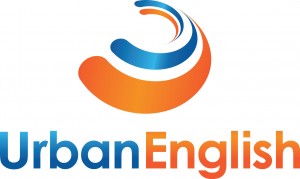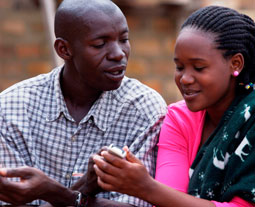

Urban Planet Mobile offers a service called Urban English, which aims to provide affordable and accessible educational content through mobile, particularly to lower income users in developing markets. The service currently has over 100,000 daily subscribers in over 14 countries. Lessons for basic phones are compressed to use minimal data, can be sent over SMS, and over 1800 short lessons are now available in 19 languages. In 2013 the service is set to launch in a wide range of new countries globally. Lessons are also delivered via smartphone application with 34 apps of 60 lessons each available for speakers of 5 languages.
Year Launched : 2010
Business Model : Consumer
Targeted Device : Basic/ Smart Phone/Feature Phone
Primary Delivery Technology : SMS, Web, Apps
Products & Services : Interactive Content
Markets Deployed In : Asia, Middle East, Africa, Latin America
Estimated Number of Users : 140,000
BACKGROUND AND OPPORTUNITY:
What opportunity existed and how was it filled by the organisation?
Many parts of the world lack access to quality educational content that is affordable and accessible, particularly in developing countries and to people of lower and middle-lower incomes. Urban Planet Mobile offers a service called Urban English which aims to tackle this access issue. The service provides lessons delivered to mobile phones at low cost. These lessons can be delivered to over 95% of mobile devices – from the most basic cell phone to smartphones. Urban English for basic phones is a subscription based program, which is marketed to subscribers by MNOs. Potential subscribers are initially given a sample of the program, after this trial they can agree to purchase the program in full. The MNO bills the subscriber for use of the full service, and operates a revenue share model with Urban Planet Mobile. Urban Planet Mobile themselves recommend the price point to be equivalent to 40% of market ARPU. In terms of technology delivery, daily audio lessons are embedded in an SMS message. Additionally, mobile apps are available for smartphones, providing lessons in audio and video with interactive quizzes and exercises.
PROGRESS SINCE LAUNCH:
How have things gone so far?
The company was founded in 2007 by Brian OliverSmith, who spent the first year researching English education and the mobile telecoms industry. In 2008, he brought on a team of people to build the first lessons that were then market tested and improved upon. In 2009 the library of Urban English was built, as were relationships with distributors, MNOs, governments, NGOs, and others who have proven essential to the success of the company and the Urban English line. In October 2010, the first launch took place with Telkomsel in Indonesia. By December, Urban English reached 50,000 daily subscribers. For the next six months daily subscriber rates stayed steady at 60,000-100,000 daily users. In 2011, the initiative faced a major setback when the government of Indonesia shut down all 3rd party programming. “This was a significant challenge for Urban English and for the growth of mobile education.” Once programming was re-started, however, the Urban English numbers jumped back up to between 30-50,000 daily users. In 2012, Urban English launched in over a dozen more countries globally. Some of the most successful country launches included Etisalat in Saudi Arabia and Tigo in Guatemala, in addition to Telkomsel and Indosat in Indonesia.
SCALABILITY:
How is the service being scaled to reach a larger audience?
Urban Planet Mobile aims to reach the widest possible audience by providing services both to the most basic phone users and smartphone users. The lessons are first developed in audio to be delivered via SMS with an embedded link that downloads the lesson, compressed to use minimal data. This audio file is then used to build the advanced line of mobile web delivery and app content. Lesson content in the mobile web setting has a video component to match the audio and include interactive exercises and quizzes. “These more robust lines are available for the growing market of smartphone users.” Another feature of the Urban English service allowing for scale arises from their teaching strategy itself. Here different lesson packages are offered, where only the basic line (i.e., introductory course) is offered in the native language. “Once the end user is beyond the basic line, all the lessons are in English only as this is proven to be better for learning. It also allows the intermediate and advanced lines to be prepared for new markets rapidly, allowing for easy expansion to new markets.” The organisation also sees that achieving scale is dependent upon effective pricing. “The product must be priced appropriately for each market and this is based on the ARPU for that market. The goal of education is to make it accessible to as many people as possible.”
USER CENTRIC ATTITUDES:
How does the organisation build itself around the end user?
In considering how to market and distribute mobile education products, Urban Planet Mobile doesn’t focus on the immediate sale but on the long-term value and benefit of the product for the end-user. For example, the company offers a service called English for Specific Purposes, which provides targeted learning to certain market segments. Here specific segments might cut across users like taxi drivers, restaurant workers and business professionals. Urban English has also been refined using user feedback. “Based on user feedback we now employ a ‘try & buy’ model that allows users to try the service for a limited time before they decide to purchase the 60-day subscription.” The organisation also underwent a large user testing pilot project with partners in Guatemala. Here they tested price points, marketing messages, as well as different types of content delivery. Users of the Urban English service were surveyed to find out what they liked about the service and if they would recommend it to others. More generally, Urban Planet Mobile understands that every market is unique and requires distinctive market entry strategies and messaging. They work closely with mobile carriers and local partners to craft marketing strategy and branding that fits the local market. “Knowledge and leadership on the local level is incredibly important for Urban English. This allows us to find the target user and communicate the value of the product to them in a way that they can understand.”
CHALLENGES:
What are the internal and external challenges currently faced?
Urban English is often the first English language learning content, and sometimes the first mobile education content in the markets where they launch. Therefore in many cases their first challenge is to convince Mobile Network Operators that users will pay for this type of service. A further challenge arises from MNOs who want to price the product high because of the short-term appeal of profitability. Here Urban Planet Mobile must convince operators that the value of mobile education is a long-term payoff. “A better educated individual earns a higher income, which leads to more purchasing power.” In other areas, the organisation experiences long delays in reporting procedures that relate to their invoicing. “Lack of procedures or constantly changing procedures for reporting, invoicing, and getting payment create delays.” The organisation also cites lack of transparency as a challenge. “Without more information from the carrier partner, it is difficult to manage the program and ensure that best practices are being implemented.” On the internal challenges side, Urban Planet Mobile has worked hard to build a proven model and thus have strong systems in place for developing content, sourcing voice talent, as well as video and sound engineers to support in developing new content and new products for mobile education. Good marketing materials are also in place to support distributors, partners, and carriers interested in carrying the Urban English product. “That being said, we are a small team with limited resources. The difficulty of getting reports and then invoices being paid on a steady basis has a large impact on the company.”
PARTNERSHIPS:
What is the value of partnerships, particularly with MNOs?
Urban Planet Mobile see relationships with their partners as a top priority, “without quality partnerships, success is unattainable.” They also stress that partnerships must ultimately be profitable and mutually beneficial in order for their model for mobile education to succeed. The organisation has had incredible success with very strong and committed MNO partners. They have found MNOs not only to embrace mobile education, but to market to subscribers on behalf of the program. “Every one of our successful launches includes direct to subscriber communication about the program by the MNO.” Urban Planet Mobile reports that their MNO partners have proven to be fully invested in providing quality educational content to their subscribers, recognizing that they have a responsibility that goes beyond high financial returns for stockholders. This being said, the organisation has also faced significant challenges in this area. For example, in the initial stages MNOs were reluctant to enter the education market. Here, Telkomsel’s success and support in Indonesia helped prove the concept of distributing education and information, not just entertainment. Urban Planet Mobile has also encountered problems when their best practices aren’t committed to by operators. “When we have bent on our stand, the program has not been successful. A failed launch is not simply a lost opportunity for Urban English to get to market. A failed launch reinforces MNO’s belief that Mobile Education is not viable. This in turn impacts mobile education across the board.” Urban Planet Mobile also indicate that MNOs can over focus on smartphone content, when the majority of users still use basic phones. “We created a program that reaches basic phones because that meant it reached the majority of people immediately, but MNOs, at times seemed content to ignore mobile education until advanced technology devices were a higher percentage of the market.” Other challenges from the MNO perspective have included finding people internal to these organisations who might champion education initiatives, the different way MNO’s in differing markets deal with VAS providers, and simply the fast-growing and changing markets in telecoms generally, which affect the way MNOs work.
LOOKING BACK, LOOKING FORWARD:
What key lessons have been learnt, and what are the organisation’s future objectives?
Since launching their Urban English product in 2010, Urban Planet Mobile has climbed a steep learning curve. They have learnt that although a solution may be ready to reach the market, they must provide a road-map of future programs that will meet market demand both in terms of the content and in terms of the technology for which the program is designed. “An MNO is only interested in investing in a relationship that they foresee lasting beyond a single program. Urban English is a program that an individual could use for 30, 60, 90 days or 4 years. We have that much content ready and on the market today.” Aside from this, they have learnt MNOs won’t invest in relationships with companies that cannot adapt to changing technologies. “Regardless of how limited smartphone penetration is, particularly in the developing world, the MNO wants to see not only the plans for more media rich programs but actual complete programs that are ready to go to market, even though the market is not ready yet for them.” Although achieving success at an early stage, the organisation realised that proving the program in a single market with a single MNO is insufficient to drive intra-regional demand. “We have had to repeatedly prove the program in several markets and regions and with several MNOs before it was accepted that Urban English is truly in demand worldwide.” In terms of future outlook, Urban English is set in 2013 to expand its presence in Southeast Asia with launches in Malaysia, Vietnam, and Burma. It will also increase presence in the Middle East and Africa with new launches in Egypt, Algeria, and Angola. With continued successes in Latin America, Urban English will be launching in almost every country in Central America and expand in South America with a massive carrier-supported campaign in Brazil. The company also plan to offer other lines, such as MobiLiteracy, a program being piloted in Uganda in 2013. “Urban Planet Mobile believes that with the power of mobile we, together, can go about Changing Lives….1 Billion at a Time.”
This document was originally produced as part of the former Mobile for Development Impact programme.


